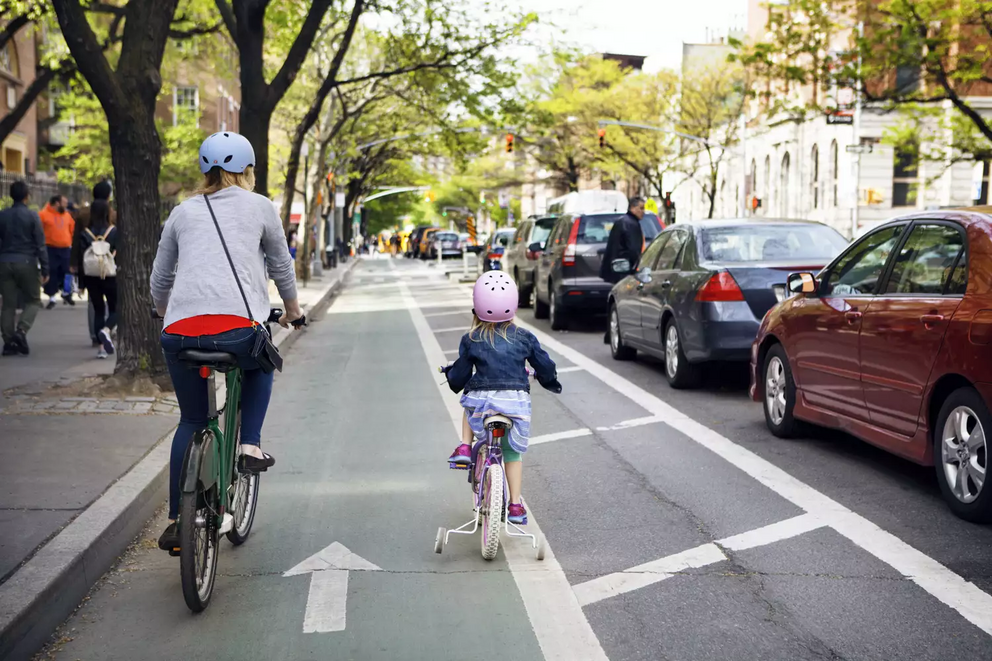Electric cars are not the only option for low-carbon transport
We have to look at the bigger picture—the transportation system efficiency.
On Halloween, my very pregnant daughter rode her e-bike down to the hospital for an ultrasound. It's just a 4-mile ride, but some were shocked that she would ride an e-bike a week before her due date. But she claimed it was much easier than walking, you could park a bike much closer to the hospital than you could park a car, and it's free. In the Canadian healthcare system, overpriced hospital parking is often the most expensive part of having a child.
She didn't get to ride home: As she notes in a tweet, the doctors decided she should have the baby right away, and I went down to get her bike and rode home in the rain.
She rides an old Electra with a Swytch conversion kit, which I wrote about but had never ridden any substantial distance. I was astonished at how easy and smooth it was, and I understood why she would rather ride it than sit in a car. It certainly was no more work, and with the bike lane network that exists in Toronto now between her house and the hospital, it's probably as safe. It would have been fun to bring her home in the cargo bike, but it is a bit bumpy for someone with a fresh C-section, so she came home in a car.
I thought of this while reading "Low-Carbon Transportation Means More Than Electric Vehicles Alone," an article by Stefen Samarripas, local policy manager for the American Council for an Energy-Efficient Economy (ACEEE). He makes the case that governments shouldn't focus so much on electric cars.
I believe it started off on the wrong foot by calling them electric vehicles (EVs) because he is already ceding the electric turf to cars when there are all kinds of electric vehicles and a whole new world of e-things. But getting over that, he got the point that it is a bigger picture:
"Many local governments are accelerating efforts to increase the use of electric vehicles (EVs) to meet ambitious climate goals, but EVs alone will not reduce transportation emissions enough to avoid the worst outcomes of climate change. EVs are not necessarily zero emission, and many people do not use automobiles as their primary mode of transportation. In urban environments particularly, people of color, those with low incomes, and younger residents are more likely than others to rely on transit and active forms of travel such as walking and biking."
Samarripas noted that "to further reduce GHG emissions and ensure equitable transportation access, governments in urbanized areas will need to take steps to better meet the needs of those who do not or cannot rely on cars for travel." He is thinking mostly about people of color or low income marginalized communities, who are historically ignored and underserved. But he also noted there has to be more focus on the needs of a younger generation that is moving into central cities and "will need energy-efficient and low-carbon transportation options that meet their needs as they age, search for larger homes, and start families."
But there is also a growing population of older people living downtown, many of whom do not want to drive. There are more people giving up cars for environmental reasons or just because they are so expensive, and there are more options now. The key is to get the mix of urban design and transportation to get the most transportation system efficiency.
"Transportation system efficiency focuses on encouraging denser urban development that attracts households and businesses to locate in close proximity to one another and allows residents to access services by walking, biking, scootering, or taking transit," wrote Samarripas. "It also involves building infrastructure to support those energy-efficient and low-carbon forms of travel. According to the Intergovernmental Panel on Climate Change, these sorts of transportation and land use strategies have the potential to reduce urban transportation-related fuel use and its associated GHG emissions by roughly 25% above vehicle electrification."
Transportation system efficiency, as defined here, means that people are not trapped in cars but have choices. My daughter could make the choice of e-biking in a mostly protected bike lane, at least by Toronto standards, as opposed to driving the car or taking the streetcar and subway, all of which are options.
This all makes Toronto sound like a model of transportation system efficiency, but it is also a city that is spending a billion dollars on rebuilding an elevated highway to save 3,000 drivers five minutes and many more billions to bury transit in concrete tubes when it could have carried more people on more routes because they refuse to look at the whole system.
Transportation system efficiency is an interesting term that we will likely hear more of. The ACEEE noted that "while vehicle electrification is often seen as the primary way to reduce transportation-related greenhouse gas (GHG) emissions, creating a broader low-carbon transportation system will be equally important to reducing GHGs and localized pollution in the long term, creating livable communities, and ensuring that our transportation system serves everyone."
It's not all about electric cars.

